Academic career
Hachmeister was born in Minden/Westphalia. He graduated from the University of Münster, writing his doctoral thesis about the history of communication research in Germany. His professorial thesis (Habilitation) deals with Franz Six, Adolf Eichmann's superior, who was nominated to rule Great Britain as the head of the SD (Security Service of the Nazi paramilitary force SS) in case of a German occupation. Hachmeister's book about Six's career [2] was widely recognized as one of the "new biographies" in the 1990s, describing in detail the mentality and role of the young academic elite in shaping the "Third Reich". [3]
Contrary to current trends in media studies and communication research, Hachmeister's "konkrete Kommunikationsforschung" [4] (concrete communication research) relies heavily on the classical socio-psychological models in US communication studies (Harold Dwight Lasswell, Robert Ezra Park). He also frequently refers to the Canadian communication theory and the German decisionist law professor Carl Schmitt.
Professional career
As a journalist, Hachmeister worked for several leading German newspapers, such as Der Tagesspiegel , Die Woche and Süddeutsche Zeitung . He is also associate professor for journalism at the University of Dortmund. His research on former Nazi intelligence specialists in the formative years of Germany's leading news magazine Der Spiegel aroused a debate about the history of the paper, which was usually considered to have pure leftist-liberal traditions. Hachmeister's documentary about the life and death of Hanns Martin Schleyer, the former head of the German employers association, who was murdered in 1977 by the Red Army Faction, won a Grimme-Award (Germany's most prestigious television prize) in 2004. The following year, The Goebbels Experiment premiered at the Berlin film festival und was selected as a New York Times critics' pick.
Hachmeister currently heads the Institute for Media and Communication Policy and is considered to be "Germany's leading media expert" ( Berliner Zeitung , 21 July 1997). The Institute is particularly known for its high-ranking media colloquia, which host international guests like Alan Rusbridger, Greg Dyke or Norman Pearlstine. Hachmeister is also the founder of the Cologne Conference, a "media Bauhaus" and festival for aesthetic and strategic trends in the audiovisual industry.
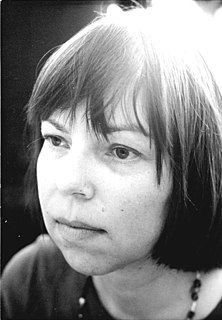
Sarah Kirsch was a German poet.
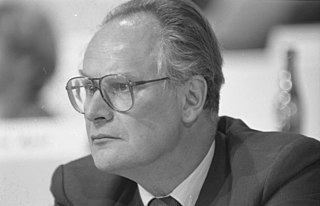
Peter Glotz was a German social democratic politician and social scientist.

Ulrich Matthes is a German actor, possibly best-known for having played Joseph Goebbels in the 2004 film Downfall.

Peter Longerich is a German professor of history. He is regarded by fellow historians, including Ian Kershaw, Richard Evans, Timothy Snyder, Mark Roseman and Richard Overy, as one of the leading German authorities on the Holocaust.
The Heyde-Sawade Affair is a 1963 film produced for the First Programme of the German Democratic Republic (GDR) television. The movie has been produced by DEFA's Babelsberg Studio near East Berlin.
Margret Antonie Boveri was one of the best-known German journalists and writers of the post-World War II period. She was a recipient of the German Critics' Prize and the Bundesverdienstkreuz.
The German Student Union from 1919 until 1945, was the merger of the general student committees of all German universities, including Danzig, Austria and the former German universities in Czechoslovakia.

Kurt Flasch is a German philosopher, who works mainly as a historian of medieval thought and of late antiquity. Flasch was professor at the Ruhr University Bochum. He was / is a member of several German and international Academies. In 2000, he was awarded the Sigmund Freud Prize by the Deutsche Akademie für Sprache und Dichtung.

Aleida Assmann is a German professor of English and Literary Studies, who studied Egyptology and whose work has focused on cultural anthropology and Cultural and Communicative Memory.
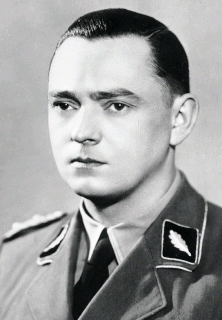
Horst Böhme was a German SS functionary during the Nazi era. He served in the SD, the intelligence service of the SS, and was a leading perpetrator of the Holocaust.

Alfred-Ingemar Berndt was a German Nazi journalist, writer and close collaborator of Propaganda Minister Joseph Goebbels.

For the composer, see Christian Hartmann (composer).
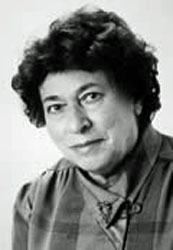
Ingeborg Weber-Kellermann was a German folklorist, anthropologist and ethnologist. She was an academic teacher, from 1946 at the German Academy of Sciences at Berlin in East Berlin and from 1961 at the University of Marburg.
Georg Wolff was a German SS Hauptsturmführer and journalist. During the Second World War, Wolff was a Head of Division III for the Sicherheitspolizei command in Oslo. He was later a leading editor for news magazine Der Spiegel, from 1952 until his retirement in 1978. It was in this latter capacity that Wolff, along with Rudolf Augstein, conducted the 1966 interview with Martin Heidegger, "Only a God Can Save Us".
Fritz Strich was a Swiss-German literature historian.
Giselher Wirsing was a right-wing German journalist, author, and foreign policy expert who was active during Nazi Germany and the Bonn republic. He was a member of the Nazi party and contributed heavily to the creation and propagation of Nazi propaganda outside Germany.
Franz Schnabel was a German historian.
Walter August Wilhelm Schulz was a German cellist, viol player and college teacher. From 1945 to 1948 he was director of the Hochschule für Musik Franz Liszt, Weimar.

Friedrich von der Leyen was a German philologist who specialized in Germanic studies.
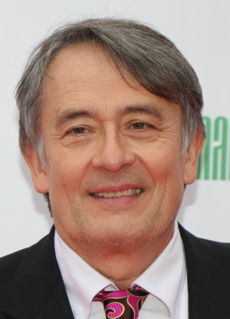
Gert Scobel is a German journalist, television moderator, author and philosopher.
This page is based on this
Wikipedia article Text is available under the
CC BY-SA 4.0 license; additional terms may apply.
Images, videos and audio are available under their respective licenses.












